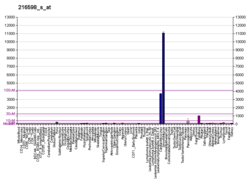The chemokine (C-C motif) ligand 2 (CCL2) is also referred to as monocyte chemoattractant protein 1 (MCP1) and small inducible cytokine A2. CCL2 is a small cytokine that belongs to the CC chemokine family. CCL2 tightly regulates cellular mechanics[5] and thereby recruits monocytes, memory T cells, and dendritic cells to the sites of inflammation produced by either tissue injury or infection.[6][7]
- ^ a b c GRCh38: Ensembl release 89: ENSG00000108691 – Ensembl, May 2017
- ^ a b c GRCm38: Ensembl release 89: ENSMUSG00000035352 – Ensembl, May 2017
- ^ "Human PubMed Reference:". National Center for Biotechnology Information, U.S. National Library of Medicine.
- ^ "Mouse PubMed Reference:". National Center for Biotechnology Information, U.S. National Library of Medicine.
- ^ Evers TM, Sheikhhassani V, Haks MC, Storm C, Ottenhoff TH, Mashaghi A (January 2022). "Single-cell analysis reveals chemokine-mediated differential regulation of monocyte mechanics". iScience. 25 (1): 103555. Bibcode:2022iSci...25j3555E. doi:10.1016/j.isci.2021.103555. PMC 8693412. PMID 34988399.
- ^ Carr MW, Roth SJ, Luther E, Rose SS, Springer TA (April 1994). "Monocyte chemoattractant protein 1 acts as a T-lymphocyte chemoattractant". Proceedings of the National Academy of Sciences of the United States of America. 91 (9): 3652–6. Bibcode:1994PNAS...91.3652C. doi:10.1073/pnas.91.9.3652. PMC 43639. PMID 8170963.
- ^ Xu LL, Warren MK, Rose WL, Gong W, Wang JM (September 1996). "Human recombinant monocyte chemotactic protein and other C-C chemokines bind and induce directional migration of dendritic cells in vitro". Journal of Leukocyte Biology. 60 (3): 365–71. doi:10.1002/jlb.60.3.365. PMID 8830793. S2CID 24481789.





